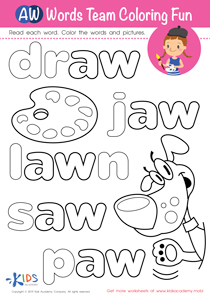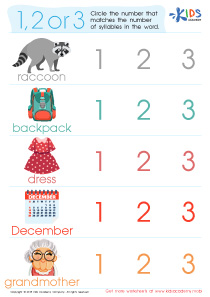Foundational Reading Lessons | Print Concepts for Ages 5-6
32 results
Introducing our engaging Print Concepts lessons, specifically designed for children aged 5-6! Our curriculum offers a blend of interactive worksheets, captivating educational videos, and assessment quizzes to ensure a comprehensive learning experience. With a focus on foundational print concepts, our lessons aim to instill a love for reading and writing in young learners. Through our carefully crafted materials, children will explore the alphabet, word recognition, and the basics of sentence structure. Each activity is tailored to captivate the imagination of 5-6-year-olds, making learning not just effective but also incredibly fun. Join us on this educational journey and lay a strong foundation for your child's literacy skills!
In the digital age, the essence of learning through tangible materials like books, worksheets, and hands-on activities remains invaluable for young minds. Our lessons on Print Concepts for Ages 5-6 are meticulously designed to bridge the gap between traditional learning and the demands of contemporary education, ensuring children not only learn but enjoy the process. These lessons are a cornerstone for kids in their foundational years, aiding them significantly in their studies and overall cognitive development.
Understanding print concepts is crucial for children aged 5 to 6 as it lays the groundwork for reading and writing. It involves grasping the basics such as knowing the difference between letters and words, recognizing that print carries a message, and understanding the mechanics of how to read a book or a page (from left to right and top to bottom in most languages). Our lessons are built around interactive worksheets that engage children in a hands-on manner, encouraging them not just to observe but to participate actively in their learning process. This interactive element ensures that children are not passive recipients of information but are actively decoding, interpreting, and understanding the print around them.
Moreover, in addition to the worksheets, we incorporate educational videos into our curriculum. These videos are not just supplementary materials but are integral to reinforcing the concepts taught through worksheets. They provide a visual and auditory learning experience, catering to different learning styles. For instance, some children might find it easier to remember a concept after watching a story or an animated explanation. These videos make learning about print concepts an enjoyable activity, thus motivating children to engage more deeply with the lessons.
Another integral part of our Print Concepts for Ages 5-6 lessons is the assessment quizzes. These quizzes are thoughtfully crafted to evaluate a child's grasp of the concepts taught. They are not just tools for assessment but are also learning experiences in themselves, as they help children and educators identify areas of strength and opportunities for further development. This feedback loop is crucial for adaptive learning, ensuring that each child can progress at their own pace while mastering the essential skills.
The benefits of our lessons on Print Concepts for Ages 5-6 extend beyond the classroom. They help children develop a love for reading and writing, which are fundamental skills not just in academic pursuits but in life. By making the learning process enjoyable and engaging, we sow the seeds for lifelong learning. Children who are comfortable with print concepts find it easier to navigate the world of words, be it in books, on signs, or on screens. This ease with language and communication opens up numerous doors for them, not just in their current studies but in their future academic and professional endeavors.
In conclusion, our lessons on Print Concepts for Ages 5-6, through a blend of interactive worksheets, educational videos, and assessment quizzes, offer a holistic approach to learning. They are not just lessons; they are experiences that shape young minds, making learning an adventure. It's an investment in a child's future, paving the way for confident readers, writers, and thinkers in the years to come.














